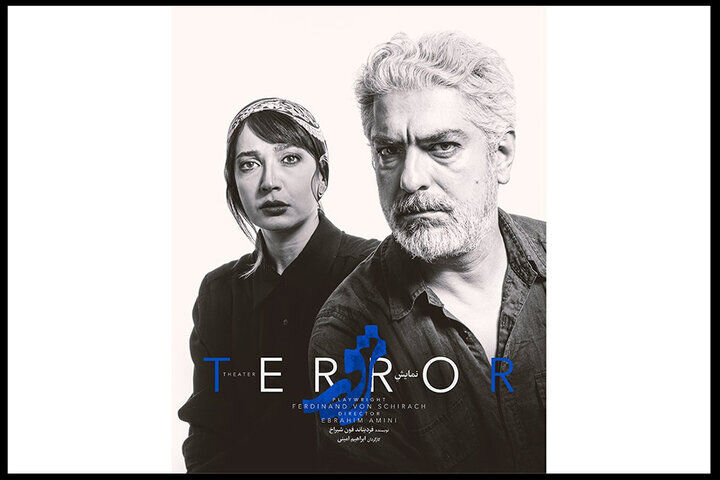Theater audiences to serve as court jury in “Terror”

TEHRAN-Iranshahr Theater Complex in Tehran will host the play “Terror” written by Ferdinand von Schirach from August 18.
Directed by Ebrahim Amini, the play has Mehdi Pakdel, Elham Nami, Vahid Rahbani, Minoo Sharifi, Ali Bagheri, and Ali Mohammad Hesamfar in the cast, Honaronline reported.
It will be the first time the play is performed in Iran after it has been staged at over 120 theaters around the world since 2015.
“Terror” is a courtroom drama, written by one of the most successful German contemporary writers, Ferdinand von Schirach. The play questions the idea of a means justifying an end and warns against quantifying human life.
The audience serves as a jury at the trial of a fighter jet pilot. He is accused of killing 164 passengers off a commercial airplane, hijacked by terrorists, heading towards a soccer stadium with 70,000 people. The end of the play depends on the verdict of the audience.
In Ferdinand von Schirach’s play, the scene is a law court, and the audiences, serving as the jury, give their verdict, guilty or not guilty.
Ferdinand von Schirach’s debut play questions the very notion of human dignity. Can any human life be measured against others, regardless of the number? What circumstances could there ever be, to avoid one catastrophe with possibly a smaller catastrophe? Who is responsible? Is it only Lars Koch alone here on trial?
The core of the play is based on a moral dilemma, one of the problems discussed within the play is the infamous “Trolly Problem”. To explain a bit more, imagine a runaway trolley barreling down a railway track. The trolley, loaded with heavy goods, is heading towards a small station where a passenger train is waiting. In mere moments the runaway trolley will crash into the station and kill hundreds of people. You are standing next to the tracks and have a chance to divert the trolley before it reaches the station. You can pull a lever next to you and switch the trolley to a sidetrack. However, on that sidetrack are five workmen. If you divert the trolley to the sidetrack, you will kill the five workmen, but you will save the hundreds at the station. What will you do?
Now imagine the same runaway trolley heading towards the station, but now you are nowhere near that lever. Instead, you are on a bridge overlooking the tracks. Next to you is an extremely large person. If you push them off the bridge onto the tracks below, their body will be large enough to slow down the train. You would kill the large person by pushing them onto the tracks, but save the passengers. What will you do now?
On average, when faced with the first scenario, most people decide to save the passengers and kill the five workmen. But when faced with the second scenario, when presented with the choice to push a man to his death to save hundreds of people, most people are uncertain.
“The Trolley Problem” coined by English philosopher, Phillipa Foote in 1961, is a well-known ethical dilemma. In 1951, the German philosopher of ethics, Hans Welzel, described this problem, which was later amended by American moral philosopher, Judith Thompson, in 1967, by adding the extremely fat man.
There have been multiple versions of the “Trolley Problem” presented over the years, each with its own twist. Another popular version of this dilemma involves deciding between saving the passengers or a loved one.
If you are having trouble deciding the correct solution to the “Trolley Problem”, don’t worry. The point of the “Trolley Problem” is not to find the right answer, but to question our moral consistency. The “Trolley Problem” highlights how our morality, our ideas of right and wrong, can be easily swayed according to the circumstances we face. As much as we like to think we are reasonable people, we are not as reasonable as we’d like to be.
Ferdinand von Schirach’s story collections “Crime” and “Guilt” and his novels “The Collini Case” and “The Girl Who Wasn’t There” were bestsellers, selling in millions in 35 different countries.
Ferdinand von Schirach, 60, is a German lawyer and writer. He became an attorney in 1994, specializing in criminal law. He published his first short stories at the age of 45 and soon became one of Germany’s most successful authors. His books have been translated into over 35 languages, and have sold millions of copies worldwide. Ferdinand von Schirach remains active in criminal law. His stories are often inspired by his experience and expertise as an attorney. Schirach has received many literature awards, internationally too; these include the prestigious Kleist Prize.
SS/SAB
